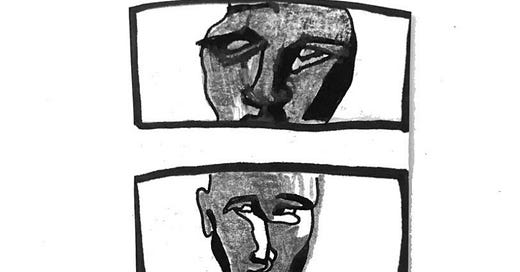Homeschooling tends to feel a lot like one big, ongoing self-evaluation. What am I doing? Why am I doing it? Should I change how I’m going about doing it? What to read, what to write about, what to practice—none of it is laid out for you, prescribed in advance. I didn’t write formal self-evaluations while I was a homeschooler, but I started to write this Substack to help me work out what I thought about what I was doing. It was hard for me, an inveterate perfectionist, to admit where I had gone wrong in both small and consequential ways. The impulse to justify or explain away the difficulties is strong in me. Instead of embracing the gap between what is the case and what I want to be the case, I have a strong urge to abdicate that responsibility.
You don’t get a lot of time for self-reflection and evaluation in college, with the endless churn of duties. You often don’t have the time to process your new experiences. Things get thrown at you and you just have to absorb them, with little thought involved. Which is why I was relieved when I learned regular evaluations were expected of students at my college—of ourselves, our teachers, even our peers. Relieved not because I like talking about my failures and shortcomings, but because I can at least recognize that my desire to be perfect isn’t healthy.
This week I had to write evaluations of myself and all my teachers. It took most of my school break, because I couldn’t just sit down and write about my performance as a clear-eyed third party spectator. I was my own evaluator, cloudy-eyed and imperfect! I would write something that I thought was honest, look at it again later, and decide it wasn’t getting at the real problems. A nice-sounding but bureaucratic sentence (a “word salad” sentence, as my mom says) can’t hide a lack of self-awareness. I tried to lay out, in plain language, the mistakes my mind works so hard to repress. I didn’t even know I’d made these mistakes until I was given the time to do the work of getting past my logical critical mind.
When I came back from doing Latin summer camp in the U.K. (the first time) I was all juiced up about how much I had learned in so little time. It was so difficult and so rewarding. But about six months later I realized the kids I went to school with weren’t nice to me; in fact they were rather mean. But because I had so much to do in the space of a day I didn’t really process that until time had dredged up memories of conversations and interactions. The result was that when I returned to Latin Camp for a second summer, I sought out a different kind of cohort of friends—less posh, less London-y, weirder, smarter, kinder—and I had a completely different experience. If I hadn’t taken the time to reflect on what went wrong and what I could do differently, I might not have gone back.
This week as I was evaluating my own practices I realized that I find it nearly impossible to tell teachers what I need—despite growing up around teachers and being quite comfortable with adults. At college so far I’ve felt too sheepish to ask for more time and attention than I think I deserve. I am still learning how to be something other than smiley and accommodating. I had to admit that I wasn’t being a good student when I didn’t ask for help.
If you’re not given the chance to reflect every now and again, all your experiences build up; they congeal, conglomerate and get progressively harder to understand. You end up making the same mistakes over and over because you didn’t fully understand what went wrong the last time. This week, the school break and the school evaluations aligned. I had the chance to ask those self-reflective questions lingering in the back of my mind. But I need to remind myself that won’t always happen in life—that I’ll have to learn how to be self aware in the present moment, in real time.




